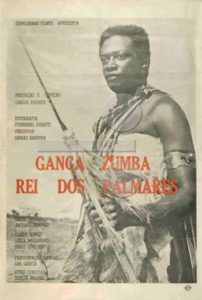
Gamga Zumbi (film poster)
*Ganga Zumba's birth is celebrated on this date in 1630. He was the first leader of the vast escaped Afro Brazilian slave settlement of Quilombo dos Palmares, or Angola Janga, in present-day Alagoas, Brazil.
Ganga Zumba is said to have been the son of Princess Aqualtune, the daughter of an unknown king of the central African country of the Congo. She led a battalion at the Battle of Mbwila.
The Portuguese won the battle, eventually killing 5,000 men and capturing the king, his two sons, his two nephews, four governors, various court officials, 95 titleholders, and 400 other nobles, who were put on ships in the Middle Passage and sold as slaves in the Americas. Ganga was likely among these captives. The whereabouts of the rest of them are unknown. Some are believed to have been sent to Spanish America. Still, Ganga Zumba, his Brother Zona, and his sister Sabina (mother of Zumbi dos Palmares, his nephew and successor) were made slaves at the plantation of Santa Rita in the Portuguese Captaincy of Pernambuco in what is now northeast Brazil, which at the time was controlled by the Dutch.
From there, they escaped to Palmares. A quilombo or Mocambo was a community of runaway slaves kidnapped to Brazil (from present-day Angola, Democratic Republic of Congo, and Congo-Brazzaville) that escaped their bondage and fled into the interior of Brazil to the mountainous region of Pernambuco. As their numbers increased, they formed maroon settlements. As many as ten separate Mocambos had formed and ultimately merged into a Quilombo of Palmares confederation under a king, Ganga Zumba. Zumba, who ruled the biggest of the villages, Cerro dos Macacos, presided over the Mocambo's chief counsel and was considered the King of Palmares. His relatives headed the nine other settlements. Zumbi was the chief of one community, and his brother, Andalaquituche, headed another.
By the 1670s, Ganga Zumba had a palace, three wives, guards, ministers, and devoted subjects at his royal compound. The compound consisted of 1,500 houses for his family, guards, and officials, all considered royalty. He was given respect and honor. In 1678, Zumba accepted a peace treaty the Portuguese Governor of Pernambuco offered, requiring the Palmarinos to relocate to Cucaú Valley. The treaty was challenged by his nephew Zumbi, who led a revolt against him. In the confusion that followed, Ganga Zumba was poisoned, most likely by one of his relatives, for entering into a treaty with the Portuguese. The Portuguese re-enslaved many of his followers who had moved to the Cucaú Valley. Resistance to the Portuguese then continued under Zumbi.
The Brazilian film Ganga Zumba was made in 1963 but was not released until 1972 because of a military coup in Brazil 1964. Films about revolutions, even those in the 17th century, were considered politically dangerous. The film is based on João Felício dos Santo's novel and focuses on a Black slave who ends up in Palmares. The film is about Black liberation and keeps a Black racial perspective. Zumba was a slave who escaped bondage on a sugar plantation and eventually rose to authority within the kingdom of Palmares, which resulted in the title of Ganga Zumba. Although some Portuguese documents regard Ganga Zumba as his proper name, which is widely used today, the most important of the documents translates the name as "Great Lord." In Kikongo, nganga a nzumbi was "the priest responsible for the spiritual defense of the community," a kilombo or military settlement comprised of multiple groups. A letter written to him by the governor of Pernambuco in 1678, which is now found in the Archives of the University of Coimbra, calls him "Ganazumba," which is a better translation of "Great Lord" (in Kimbundu).